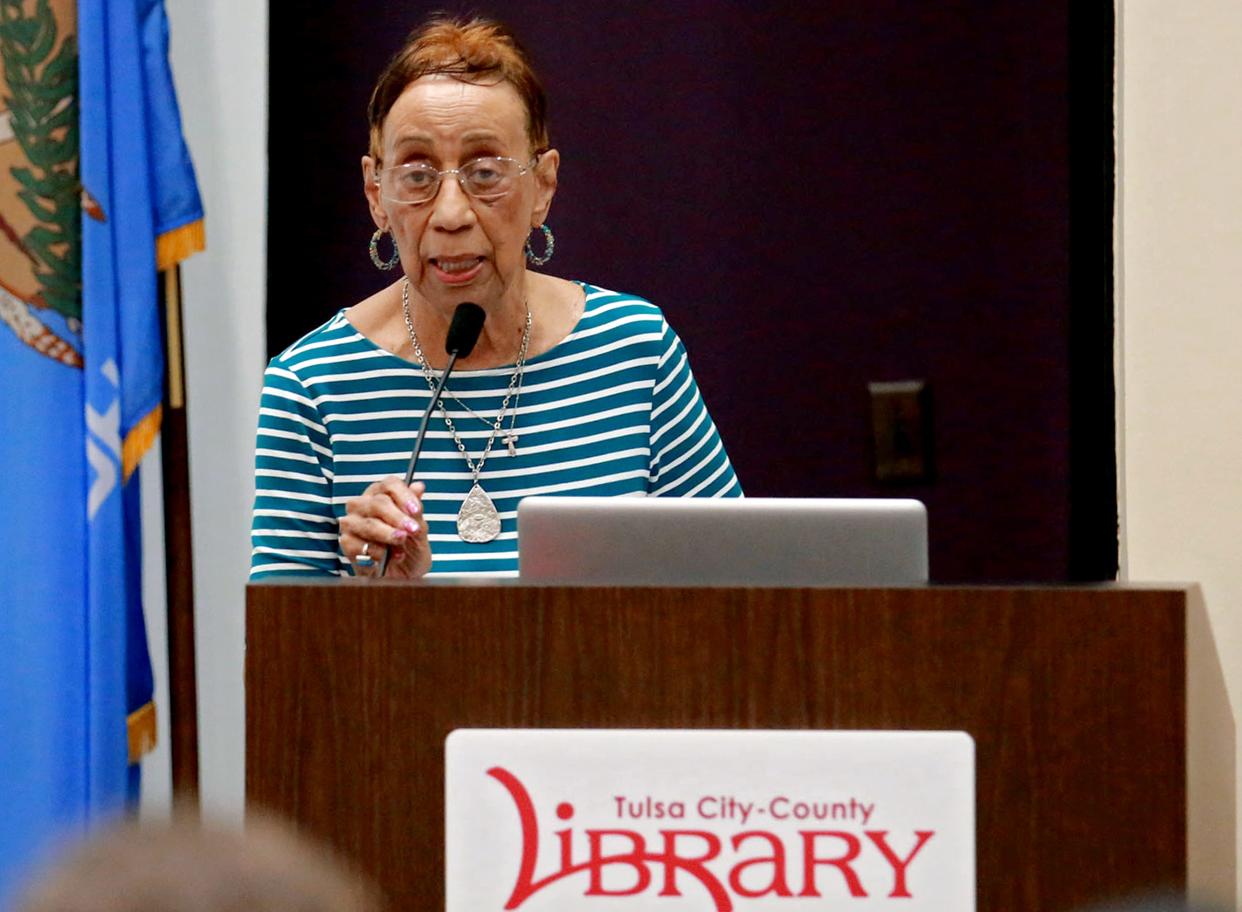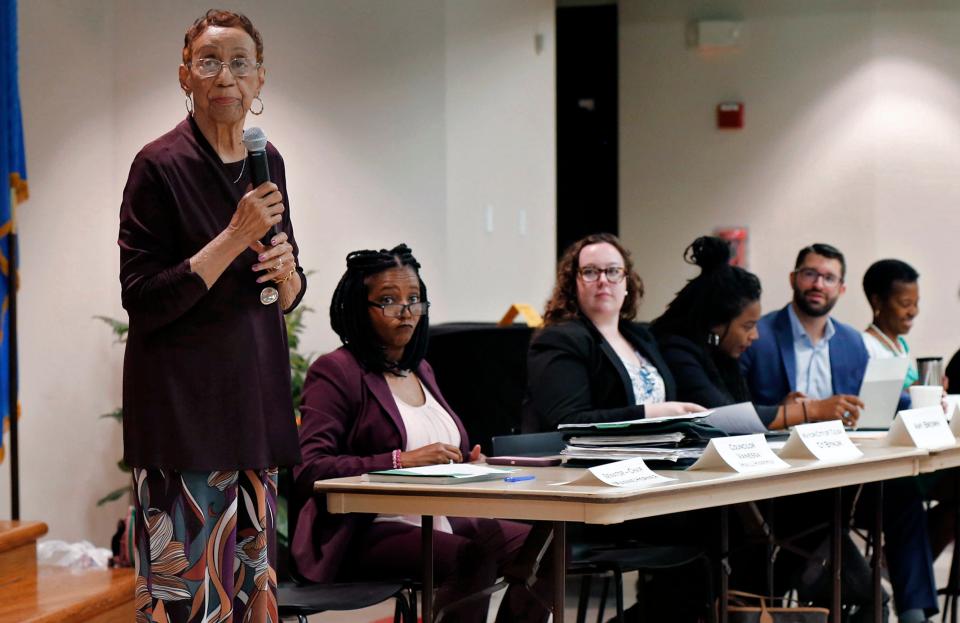Maxine Horner: The quiet state senator who helped send thousands of children to college

- Oops!Something went wrong.Please try again later.
TULSA — She was quiet. Even though she held an elected office, she wasn’t one to make herself known. Most people outside of her legislative district didn’t even know who she was.
She liked kids. On any given day, you’d find her in the halls of the Capitol speaking to a group of pages or a family with children.
She liked jazz, too. In fact, she was such a fan she helped found the Oklahoma Jazz Hall of Fame.
A Democrat from Tulsa, the late state Sen. Maxine Horner was elected to the Oklahoma Senate in 1986. She served 19 years until 2005, when she retired because of term limits. Horner, along with then-state Sen. Vicki Miles-LaGrange, was one of the first two Black women elected to the state Legislature.
Still, Horner wasn’t one to thrust herself into the spotlight. Instead, she worked quietly, behind the scenes. Her quiet approach to politics and policy paid off, too.
A quiet approach to state politics, policy
While other lawmakers spent their careers trying to get national attention, Horner quietly crafted one of the most important pieces of legislation ever produced by an Oklahoma lawmaker — Oklahoma's Promise scholarship program.
Originally known as the Oklahoma Higher Learning Access Plan (OHLAP), the program was Horner's brainchild.
"She worked on that bill for quite a while," said Bill Thoms, a former education policy analyst for the Oklahoma Senate. "She got the idea after seeing a television show about a millionaire who paid for several students' college education."
That millionaire was Patrick F. Taylor. In 1988 Taylor spoke to 183 underachieving inner-city seventh- and eighth-grade students at Livingston Middle School in New Orleans East.
More: Maxine Horner, one of first Black women in Oklahoma's Senate, dies at 88
"These students had been held back in school, many more than once. They were not expected to make it past the 8th grade, let alone enter high school. Most had lost all hope in themselves and were planning to drop out of school," a story on the website about Taylor said.
According to the story, Taylor asked the students whether they wanted to go to college, and every hand in the room went up. Curious about this paradox, Taylor learned the students' parents could not afford to send their children to college, and they were not pushing their children to do well in school.
Taylor challenged the kids, telling them if they maintained a B average in school in a college prep curriculum and stayed out of trouble, he would make sure they could go to college. About half the class graduated from high school, and Taylor made good on his promise.

Horner, Thoms said, thought the Taylor plan could be applied in Oklahoma.
"She wanted to make sure each kid would have the opportunity to go to college," Thoms said. "It took her awhile, but she got it done."
Originally targeting lower income families, the rules for the Oklahoma Promise were simple: Families had to had an income level of $22,000 or less, and the students had to maintain a C-average GPA, stay out of trouble, not use drugs, not skip school and take the required classes.
The plan caught on quickly.
Sen. Horner knew what she was doing, Thoms said.
"Pretty quickly, many members of the Legislature recognized they had a Christmas tree in front of them (with the bill). They could brag to constituents of what a wonderful thing they did. It took her awhile to get it funded, but in the end she was successful."
Horner's colleague, former Senate Pro Tempore Cal Hobson, a Democrat from Lexington, agreed. "She was successful because of intelligence, perseverance, tenacity and ‘just general common sense.’"
Horner used the long-term approach get OHLAP funded.
"The first year she got the bill passed, but it wasn't funded," Hobson said. "So she spent the interim and the next session talking to lawmakers, to anyone who would listen, about how the bill would change lives. By the time the funding came up for a vote, she had the support she needed."
Tens of thousands of Oklahoma students received help through OHLAP scholarship
Records from the Oklahoma Regents for Higher Education show that Horner's bill did, indeed, change lives.
High school graduates from 1996 were the first students to receive the OHLAP scholarship.
"A total of 637 students completed the OHLAP program requirements in high school and were eligible for the scholarship in 1996-97. Of these, 469, or 74% actually received scholarships," a report about the program noted.
Twenty-eight years later, the scholarship program awarded scholarships to 18,224 students during the 2022-2023 school year.
Horner heard from many of them, too. Before her death in 2021, Horner said she received "hundreds and hundreds of letters" from students who had gone to college or vocational school on an Oklahoma's Promise scholarship.
During the 2017 celebration of the program, Horner said she was excited by the number of students who had received the scholarship.
"I am so excited about 76,000 and all of you here," Horner said at the time. "I hope there will be many more added to the 76,000."
That prediction proved accurate. Over its lifetime, Oklahoma's Promise has awarded scholarships to 109,963 Oklahoma students.
The program, Thoms said, permanently changed the lives of thousands of students.
"It was one of the two or three things that I had a hand in that I felt best about," Thoms said. "Senator Horner's plan focused on kids who were gonna have a struggle paying their way. It gave them a chance."
This article originally appeared on Oklahoman: Maxine Horner, first Black woman in Oklahoma Senate, changed lives

